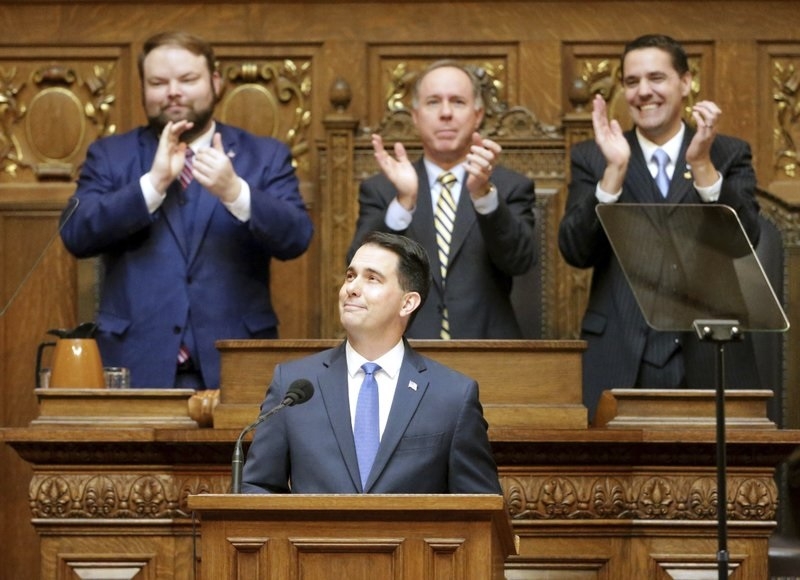National
AP FACT CHECK: Gov. Walker State of State claims take rosy view

MADISON, Wis. — Gov. Scott Walker’s State of the State speech put a positive spin on his seven-year record and new proposals as he seeks re-election in November. But many of the facts, figures and statements bear a closer examination.
A look at his comments:
WALKER: “The state property tax is gone.”
THE FACTS: It’s true that the Legislature, at Walker’s urging, eliminated the state property tax that had generated money to benefit the state’s forestry program. But what Walker fails to mention is the tax amounted to less than 17 cents per $1,000 of taxable income, or $27 a year on a median-value $160,000 home. Most property taxes paid by homeowners are levied and collected locally by school districts, cities, counties and technical colleges. Overall, total property taxes on the owner of a median-valued home are projected to be about flat this year and down about $22 next year. The Wisconsin Policy Forum, which tracks property tax changes across the state, has long cautioned against putting too much stock in the median-valued home number as a measurement. “It really doesn’t provide much information about what is taking place in individual communities, where the conditions vary widely due to differences in property values, tax levies, and tax rates,” said the group’s spokesman David Callender.
WALKER: “Since we started requiring employment and worker training, more than 25,000 people have gained employment.”
THE FACTS: Walker is referring to the state law he backed requiring able-bodied adults receiving food stamps to be working or receiving job training at least 20 hours a week. He’s now calling on the Legislature to expand the requirement to 30 hours a week and also impose it on parents of children ages 6 to 18 starting in October 2019. Walker is correct that more than 25,000 people have found jobs since the requirement took effect in April 2015. But what he fails to mention is that since then, an even greater number, up to 86,000, have lost their food stamp benefits. That figure includes people who got off food stamps because they found a job. It also could be counting the same person multiple times, if they’ve gone on and off the program.
WALKER: “The biggest concern I hear about is from those who are worried about pre-existing conditions. With that in mind, I propose that we enact a law in Wisconsin that will guarantee coverage of pre-existing conditions.”
THE FACTS: The move to protect people with pre-existing conditions comes after Walker considered seeking a waiver to let Wisconsin opt out of the federal law’s pre-existing condition rules. When Walker first announced his support for a state law guaranteeing insurance coverage for people with pre-existing conditions, he said he wanted the Senate to pass a bill already approved by the Assembly that would do that. However, the Assembly bill would only protect people who have had insurance coverage for 12 months in a row with no break longer than 63 days. If those requirements aren’t met, then insurance companies could charge more. It would also only take effect with the repeal of the federal health care law known as “Obamacare,” which currently guarantees coverage for people with pre-existing conditions. Democrats who originally supported the pre-existing condition guarantee no longer back the bill as it passed the Assembly. In a switch from his initial statement, Walker is now saying he simply wants the pre-existing coverage guarantee and it does not have to be the bill that passed the Assembly.
WALKER: “Since it was first approved in 2002, the state has asked for an extension of SeniorCare four times. It is time to make this a permanent and stable program.”
THE FACTS: Walker is now loudly defending the state’s popular discount prescription drug program for people over age 65 after he tried twice in 2011 and 2015 to dramatically scale it back. Both times, Walker retreated in the face of strong bipartisan opposition. Walker had wanted to force enrollees to first sign up for Medicare Part D prescription drug coverage, with the state program only covering what the federal one did not. That would have cut SeniorCare benefits by about 40 percent. Keeping the program running in its existing form requires a federal waiver that must be renewed every four years. Walker has said that if he can’t get a permanent extension, he wants one that lasts longer than four years. Permanent exemptions aren’t permitted and to do it would require a change in current law, said Robin Rudowitz, a Medicaid expert at the Kaiser Family Foundation in Washington.
2018 Wisconsin State of the State Address
Governor Walker presents his Ambitious Agenda to Wisconsin legislators and taxpayers at his eighth State of the State Address.
Posted by Governor Scott Walker on Wednesday, January 24, 2018







